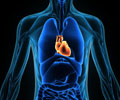Research in mice suggests that targeting fat cells could help in treating patients with heart failure.

Dyck says, "Many people believe that, by definition, heart failure is only a condition of the heart. But it's much broader, and multiple organs are affected by it."
He explains that targeting fat cells with a drug and limiting their ability to release stored fat during heart failure protects the heart and improves cardiac function.
The body releases stress hormones (cortisol, epinephrine, and norepinephrine) during stressful times, like heart failure, to help the heart compensate. However, since the heart can't function and gets damaged more by pumping faster, more stress hormones are released, and the cycle continues, with heart function declining more.
Due to this, beta-blocker drugs, designed to block the effects of stress hormones on the heart, are a standard treatment for heart failure. Lipolysis is the process by which fat, stored in fat cells, is released into the bloodstream to provide extra energy to the body. The release of stress hormones triggers this process.
The research team found that during heart failure in mice, fat cells' inflammation throughout the body mobilized and released fat faster than usual, putting additional stress on the heart, thereby increasing damage and declining heart function.
Advertisement
"This work is a proof-of-concept showing that abnormal fat-cell function contributes to worsening heart failure, and now we're working on understanding the mechanisms of how the drug works to limit lipolysis better," he said. "Once we get that, that's the launchpad for making sure it's safe and efficacious, then advancing it to our chemists, and then maybe some early trials in humans."
Advertisement
Source-Medindia















